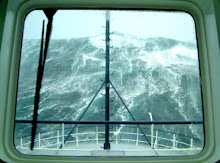13:19 - "And Moses took the bones of Joseph with him..." (This must mean Joseph's mummy, right, per Genesis 50:26.)
13:21 - Interesting: "And the LORD went before them by day in a pillar of cloud, to lead them the way; and by night in a pillar of fire, to give them light; that they might go by day and by night." If memory serves, this is the first time we read in the Torah about something (a) supernatural/miraculous, something that couldn't even possibly be explained away, and (b) that was witnessed by the masses.
14:19 - God gets ready to part the Red Sea, when we read that "And the angel of God, who went before the camp of Israel removed and went behind" the Egyptians. Huh?!? Didn't we just read in 13:21 that it was "the LORD" that was doing the guiding?!? Did I miss something?
15:1-18 - The Song at the Sea in praise of God... Quite beautiful, actually. But there are some snags. How was Moses able to sing about things that hadn't yet happened? Like what Pharaoh said after the Israelites had left (15:8)! Like speaking of the destruction of the peoples of the Promised Land in the past tense (15:14-16)! The building of the Temple (15:17)! Geesh.
15:20-21 - Nice interlude for Miriam here, who, after the long Song at the Sea, "took a timbrel in her hand; and all the women went out after her with timbrels and with dances" and sang.
15:26 - Ah yes, the fire and brimstone: After only three days wandering the desert, they can't find water, and the people turn to Moses for answers. God provides water, saying "'If thou wilt diligently hearken to the voice of the LORD thy God, and wilt do that which is right in His eyes, and wilt give ear to His commandments, and keep all His statutes, I will put none of the diseases upon thee, which I have put upon the Egyptians; for I am the LORD that healeth thee.'" I know I have a lot to learn in terms of understanding the role of punishment vs. rewards, and I'm sure my thinking will evolve on the subject...but frankly this is some of the hardest stuff to swallow in the Torah: That punishments and rewards are causal effects of whether or not I observe the law. I just don't -- I can't -- see the world working this way. I can't believe in a God that operates in this manner, nor in a religious-legal system predicated on God doing so.
16:2-3 - So this is where Jewish whining comes from: "...and the children of Israel said unto [Moses and Aaron]: 'Would that we had died by the hand of the LORD in the land of Egypt, when we sat by the flesh-pots, when we did eat bread to the full; for ye have brought us forth into this wilderness, to kill this whole assembly with hunger.'" Nice! But it makes me wonder: Why don't we talk about this during Passover? I think it would make a good subject: Why is it, just when we've gotten the greatest thing in the world (i.e., freedom), we complain and want more? I would think the haggadah should talk about this lessons in this...
16:13-15 - Another nomination for the "strangest verses in the Torah" award: God produces manna, apparently overnight, and in the morning, "when the layer of dew was gone up, behold upon the face of the wilderness a fine, scale-like thing, fine as the hoar-frost on the ground." Say what? Kehot translates this as follows:
When the sun rose and the layer of dew rose, behold, over the surface of the desert a thin substance that had been packed within the two layers of dew was exposed, as if the dew had been peeled back. It had a thin crust on top and was as fine as the frost on the ground. Underneath this was another layer of dew. This substance was thus protected by dew both above and below. Although dew usually descends from the atmosphere onto the earth, here, the dew miraculously rose from the ground.I still can't figure out what this is supposed to look like...
17:11-12 - Curious: When Moses physically lifts his hand on the hill top, Joshua and the Israelites prevail over the forces of Amalek. When Moses lowers his hand, though, Amalek prevails. As if to drive the point home that there is an actual connection between the position of Moses's hand and the fortune of the Israelites in battle, we read that "Aaron and Hur stayed up his hands, the one on the one side, and the other on the other side; and his hands were steady until the going down of the sun." Why was this necessary? Why not just wave the staff once or some such thing? Seems like overkill.
17:14-16 - I don't get it. A couple mitzvot directly pertain to never forgetting what Amalek did and to destroy their seed...but what did they do that was so bad? This is it? Huh...




